|
|
| |
|
| |

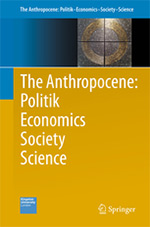
The Anthropocene
Politik – Economics – Society – Science (APESS)
Edited by
Hans Günter Brauch,
AFES-PRESS, chairman
Free University of Berlin (Ret.)
A Peer Reviewed Book Series
ISSN: 2367-4024
APESS
Vol 15 |
Sabit Erşahin - Selim Kapur - Erhan Akça - Ayten Namlı - Hakkı Emrah Erdoğan (Eds.): Carbon Management, Technologies, and Trends in Mediterranean Ecosystems (Cham-Heidelberg - New York - Dordrecht - London: Springer- Springer International Publishing, 2017).
ISBN: 978-981-10-3051-2 (Softcover)
ISBN: 978-981-10-3051-2 (EBook)
Doi: 10.1007/ 978-981-10-3051-2 (add chapter no.)
Order this book on Springer Website |
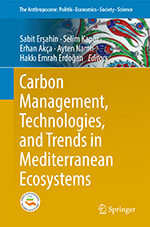
|
| |
|
|
On this Book
This book is unique covering both ecologic and socio-economic aspects of carbon management in Mediterranean ecosystems. The chapters were originally presented at the 1st Istanbul Carbon Summit that was held at Istanbul Technical University, 2-4 April 2014 and subsequently revised after a peer review process. The summit focused on carbon management, carbon technologies, and carbon trends. This book includes chapters on economic aspects of carbon management and on ecological aspects of the carbon cycle. The chapters on economic aspects analyze carbon trade and its institutional, political, and legislative structures in different Mediterranean nations, while those on ecological aspects review the discussion and analysis of the related ecological factors and their feedbacks due to governance processes.
This book:
- discusses carbon trade in Mediterranean countries;
- examines social ecology of carbon management in ecosystems taking different socio-economic and socio-ecologic structures in the Mediterranean region into account;
- offers original research results on carbon sequestration.
Contents
Introduction
1: Soil Carbon Impacts on Functionality and Environmental Sustainability (Rattan Lal)—2: New World Atlas of Desertification and Issues of Carbon Sequestration, Organic Carbon Stocks, Nutrient Depletion and Implications for Food Security (P. Zdruli, R. Lal, M. Cherlet, S. Kapur)—3: Terrestrial Ecosystem Carbon Dynamics as Influenced by Land use and Climate (S. Erşahin, S. Kapur, G. Aydın, E. Akça, D. Tolunay, Ö. Görücü, G. Karahan, B. C. Bilgili)— 4: EU Emissions Trading Scheme Application in Bulgaria, Greece and Romania from 2008 to 2012 (C.-S. Hatzilau, D. Giannakopoulos, S. Karellas, E. Kakaras—5: Indigenous Egyptian Nubians and Climate Change Mitigation (E. H. M. Ahmed)—6: Carbon Trading Via Exports: Comparison of the Emissions Embodied In Exports In China And Turkey (N. Erk, A. Vural Cengiz)—7: Energy–Economy–Ecology–Engineering (4E) Integrated Approach for GHG Inventories (E. Sulukan, M. Sağlam, T. Sıdkı Uyar)—8: Cost-Benefit Assessment of Imple-menting LULUCF Accounting Rules in Turkey (O. Bouyer, Y. Serengil)—9: Carbon Certification of Afforestation/Reforestation Areas in Turkey (H. Ülgen, M. Kuş, Y. Güneş, R. Kiriş, A.Özel, U. Zeydanli)—10: Carbon Sequestration and Mycorrhizae in Turkish Soils (I. Ortaş , R. Lal, S. Kapur)
Backmatter: About the Editors—About the Authors—About the Book ). |
On the Editors
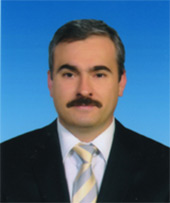 |
Sabit Erşahin, born in 1963 in Artvin, Turkey. Prof. in Soil Science at the Faculty of Forestry of Çankırı Karatekin University, Turkey. He is active member of Soil Science Society of America for 22 years and Soil Science Society of Turkey for 26 years. He served as scientific committee member at Food, Agriculture and Forestry division of Scientific and Technological Committee of Turkey from 2005 to 2008. He has expertise in soil physics, hydropedology, and computer modeling of soil processes. He has been member of scientific board for General Directorate of Agricultural Research under Ministry of Food, Agriculture, and livestock and General Directorate of. Combating Desertification and Erosion Control under Ministry of Forestry and Water Affairs of Turkey.
Address: Çankırı Karatekin University, Faculty of Forestry, 18200 Bademlik, Çankırı, Turkey
Email: <ersahin@karatekin.edu.tr>
Website: <http://acapsu.wix.com/sabitersahin> |
| |
|
Selim Kapur, born in 1946 in Ankara, Turkey. Emeritus Professor of Soil Science at the Faculty of Agriculture and Chairman of the Dept. of Archaeometry at the University of Çukurova, Adana, Turkey. He is the Scientific Comm. Member of the European Soil Bureau Network of the EU-JRC-IES in Ispra, Milan, Italy. He is the earlier Secretary of the International Working Group of Land Degradation and Desertification. Has acted as the Science and Technology Correspondant of Turkey for the UNCCD. Has organized the First International Meeting on Land Degradation and Desertification in 1996 in Adana, Turkey. He led projects. supported by NATO, EU, JSPS, TUBITAK, Mitsui Environmental Fund, FAO and GEF concerning soil protection and environmental issues. He authored numerous papers in cited and authored/edited books on Land degradation and desertification, archaeometry and micromorphology.
Address: University of Çukurova, Department of Soil Science and Archaeometry, 01330, Adana, Turkey.
Email: <kapurs@gmail.com>
Website: <www.cu.edu.tr> |
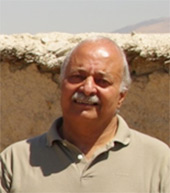 |
| |
|
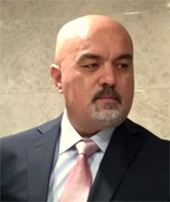 |
Erhan Akça, born in 1969 in Adana, Turkey. Assoc. Prof. Dr. at Adıyaman University School of Technical Sciences, Adıyaman, Turkey. His profession is on soil mineralogy, archaeometry and natural resource management. He wrote and contriburted to more than 110 scientific publications (papers, chapters, books) on soil science, archaeometry, land use and desertification. he participated to projects supported by NATO, EU, JSPS, TÜBİTAK, Mitsui Environmental Fund, FAO and GEF. He is currently scientific board member of Ministry of Forestry and Water Works, General Directorate of Combating to Desertification and Erosion Control of Turkey.
Address: Adıyaman University, School of Technical Sciences, 02040, Adıyaman, Turkey.
Email: <eakca@adiyaman.edu.tr>
Website: <www.adiyaman.edu.tr> |
| |
|
Ayten Namlı, born in 1965 in Hatay, Turkey. Prof. Dr. at Ankara University Faculty of Agriculture, Ankara, Turkey. She is working on land degradation, soil health, soil biology, water and soil pollution and bioremediation, waste management, waste water sewage sludge. Supervising: Alignment of Turkey’s National Action Plan With UNCCD 10- Years Strategy and Reporting Process, FAO Project Symbol: GCP/TUR/060/GFF. Executive member of TUBITAK-TEYDEB since 2012; National Committee Member of GEF – UNDP Small Grant Project from 2011; Environment Office in TBMM (Turkish Grand National Assembly); Presidents of the Federation of Eurasia Soil Science Society and Soil Science Society of Turkey. International Advisory Committee member of 20th World Soil Congress of 2014; member of Land degradation/desertification thematic working group in National Capacity Self-Assessment Project (NCSA); Scientific committee member in UN-CRIC 7; NGO’s expert’s team member in the International Training on Combating Desertification.
Address: Ankara University, Faculty of Agriculture, Department of Soil Science and Plant Nutrition, 06100, Ankara, Turkey.
Email: <namli@ankara.edu.tr>
Website: <www.agri.ankara.edu.tr> |
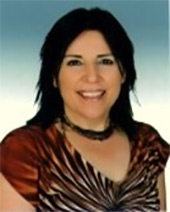 |
| |
|
 |
Dr. Hakki Emrah Erdoğan, born in 1976 in Ankara, Turkey. His background is soil science, and specialist on earth monitoring systems. Formerly, he was a scientific officer at the EC-JRC in Ispra, Italy. Currently, he is a coordinator of Agro-Environment and Natural Resource Protection Division at the Ministry of Food, Agriculture and Livestock, Ankara, Turkey. His responsibility is specifically on the GHG emissions and biomass management in agricultural lands, and he performs to ensure the synergies between soil management, food security and climate change. In international era, he is vice-chair of European Soil Partnership and member of national delegation for the UNCCD and UNFCCC discussions. He is also coordinating technical outcomes for reporting mechanism of LULUCF sector in the part of the UNFCCC National Inventory Report. His writing includes several articles on soil science, land degradation, land use/cover changes and geospatial analysis.
Address: Ministry of Food, Agriculture and Livestock, Agro –Environment and Protection of Natural Resources, Ankara, Turkey.
Email: <hakki.erdogan@tarim.gov.tr>
Website: <www.tarim.gov.tr>. |
About the Authors
| |
Prof. Dr. Lal Rattan, School of Environment and Natural Resources, Ohio State University, 422B Kottman Hall, 2021 Coffey Rd., Columbus, OH 43210, USA.
Prof. Dr. Selim Kapur, University of Çukurova, Department of Soil Science and Archaeometry, 01330, Adana, Turkey.
Prof. Dr. Pandi Zdruli, International Centre for Advanced Mediterranean Agronomic Studies, Mediterranean Agronomic Institute of Bari (CIHEAM IAMB), Bari, Italy.
Dr. Michael Cherlet, European Commission, Joint Research Centre, Institute for Environment and Sustainability, Land Resource Management Unit Via Enrico Fermi 2749 TP280, I-21027 Ispra (VA), Italy.
Prof. Dr. Sabit Erşahin, Department of Forest Engineering, Faculty of Forest, Çankırı Karatekin University, 18100 Bademlik, Çankırı, Turkey.
Prof. Dr. Gönül Aydın, Adnan Menderes University, Department of Plant Nutrition and Soil Science, Muğla, Turkey.
Assoc. Prof. Dr. Erhan Akça, Adıyaman University, School of Technical Sciences, Adıyaman, Turkey.
Prof. Dr. Doğanay Tolunay, Department of Forest Engineering, Faculty of Forestry, İstanbul University, İstanbul, Turkey.
Prof. Dr. Özden Görücü, Kahramanmaraş Sütçü İmam University, Department of Forestry, Kahmaramaraş, Turkey.
Ass. Prof. Dr. Gülay Karahan, Department of Landscape Architecture, Faculty of Forest, Çankırı Karatekin University, 18100 Bademlik, Çankırı, Turkey.
Assoc. Prof. Dr. Bayram C. Bilgili, Department of Landscape Architecture, Faculty of Forest, Çankırı Karatekin University, 18100 Bademlik, Çankırı, Turkey.
Dr. Christina-Stavrula Hatzilau, School of Mechanical Engineering. Thermal Engineering Section, National Technical University of Athens, 9. Heroon Polytechniou Str. 15780 Athens, Greece.
Dr. Dionysios Giannakopoulos, Centre for Research and Technology Hellas / Chemical Process & Energy Resources Institute 4th km, Ptolemais-Mpodosakeio- P.O. box 95 - GR 502 00 Ptolemais, Greece.
Assoc. Prof. Dr. Sotirios Karellas, Laboratory of Steam Boilers and Thermal Plants. School of Mechanical Engineering. Thermal Engineering Section, National Technical University of Athens, 9. Heroon Polytechniou Str. 15780 Athens, Greece. |
|
Prof. Dr. Emmanuel Kakaras, Laboratory of Steam Boilers and Thermal Plants. School of Mechanical Engineering. Thermal Engineering Section, National Technical University of Athens, 9. Heroon Polytechniou Str. 15780 Athens, Greece.
Dr. Essam Hassan Mohamed Ahmed, Climate Change and Sustainable Development, El Haram, Giza, Egypt.
Prof. Dr. Nejat Erk, Çukurova University, School of Economics and Administrative Studies, Adana, Turkey.
Dr. Ali Vural Cengiz, Çukurova University, Institute of Social Sciences, Adana, Turkey.
Dr. Egemen Sulukan, Department of Professional Sciences, Turkish Naval Academy, Tuzla, Istanbul, Turkey.
Mustafa Sağlam, Institute of Pure and Applied Sciences, Department of Mechanical Engineering, Marmara University, Göztepe, Istanbul, Turkey.
Prof. Dr. Tanay Sıdkı Uyar, Marmara University, Faculty of Engineering, Mechanical Engineering Department, 34722, Istanbul, Turkey.
Olivier Bouyer, SalvaTerra, 6 rue de Panama 75018 Paris, France.
Prof. Dr. Yusuf Serengil, İstanbul University, Faculty of Forestry, Turkey.
Hüma Ülgen, Nature Conservation Centre, 1293. Sok. No:9/32 Beyazıt Apt. Aşağı Öveçler 06460 Çankaya Ankara, Turkey.
Melike Kuş, Nature Conservation Centre, 1293. Sok. No:9/32 Beyazıt Apt. Aşağı Öveçler 06460 Çankaya Ankara, Turkey.
Prof. Dr. Yusuf Güneş, İstanbul University, Faculty of Forestry, Department of Forest and Environmental Law, 34473 Bahçeköy Sarıyer İstanbul, Turkey.
Rüstem Kiriş, Department of Inspection, the Ministry of Forestry and Water Affairs, Söğütözü Cad. No: 14/E Ankara, Turkey.
Ali Özel, Forest Management Unit, the Ministry of Forestry and Water Affairs, Söğütözü Cad. No: 14/E Ankara, Turkey.
Dr. Uğur Zeydanli, Nature Conservation Centre, 1293. Sok. No:9/32 Beyazıt Apt. Aşağı Öveçler 06460 Çankaya Ankara, Turkey.
Prof. Dr. İbrahim Ortaş, University of Çukurova, Department of Soil Science and Plant Nutrition, 01330, Adana, Turkey. |
| |
. Subseries on Mediterranean Soil Ecosystems (MSE)
Publication of the Soil Science Society of Turkey (SSST)
Editors: Sabit Erşahin, Selim Kapur, Erhan Akça,
Ayten Namlı, Emrah Hakkı Erdoğan
International Advisory Board |
| |
|
|
- Ahmet Mermut, University of Saskatchewan, Saskatoon, Canada/University of Harran, Şanlıurfa, Turkey
- Alexander Tsatskin, University of Haifa, Haifa, Israel
- Alex Mc Bratney, University of Sydney, Sydney, Australia
- Angel Faz Cano, University of Cartagena, Polytechnic University of Cartagena, Cartagena, Spain
- Claudio Zucca, ICARDA, Amman, Jordan
- Costas Kosmas, Agricultural University of Athens, Athens, Greece
- Danny Itkin, Ben-Gurion University of the Negev, Beer Sheva, Israel
- Derya Sürek, The Soil, Fertilizer and Water Resources Research Center, Ankara, Turkey (SK)
- Edoardo Costantini, Centro di recerca per l’agrobiologia e la pedologia, Firenze, Italy
- Eswaran Padmanaphan, University of Science and Technology, Selangor, Malaysia
- Franco Previtali, University of Milan (Bicocca), Milan
- Gönül Aydın, Adnan Menderes University, Aydın, Turkey
- Hayriye İbrikçi, University of Çukurova, Adana, Turkey
- İbrahim Atalay, Mehmet Akif University, Burdur, Turkey
- İhami Bayramin, University of Ankara, Ankara, Turkey
- John Ryan, International Center for Agricultural Research in Dry Areas, Aleppo, Syria
- Koray Haktanır, University of Ankara, Ankara, Turkey
- Kume Takashi, Department of Rural Engineering, Ehime University, Ehime, Japan
- Luca Montanarella, Joint Institute of Environment and Sustainability, Milan, Italy
|
|
- Marcello Pagliai, Centro di recerca per l’agrobiologia e la pedologia, Firenze, Italy
- Marie-Agnes Courty, French National Centre for Scientific Research (CNRS), Paris, France
- Michael Cherlet, Joint Institute of Environment and Sustainability, Milan, Italy
- Michael A. Wilson, USDA-NRCS, Soil Survey Division, World Soils, Washington DC, USA
- Nicola Senesi, University of Bari, Bari Italy
- Pandi Zdruli, Mediterranean Institute of Bari (MAI-B), Bari, Italy
- Rana Özbal, Koç University, Istanbul, Turkey
- Rattan Lal, The Ohio State University, Ohio, Columbus, USA
- Rivka Amit, Geological Survey of Israel, Jerusalem, Israel
- Salah Tahoun, El Zagazig University, Cairo, Egypt
- Sideris Theocharopoulos, Nagref Soil Institute, Athens, Greece
- Steven Nortcliff, University of Reading, Reading, UK
- Takanori Nagano, Kobe University, Kobe, Japan
- Tallal Darwish, National Center for Scientific Research, Beirut, Lebanon
- Tony Koppi, University of New South Wales, New South Wales, Australia
- Tsuhigiro Watanabe, Research Institute of Humanity and Nature, Kyoto, Japan
- Uriel Safriel, Hebrew University of Jerusalem, Jerusalem, Israel
- Winfried E. H. Blum, University of Natural Resources and Applied Life Sciences, Vienna, Austria
|
| |
|
|
Mediterranean Soil Ecosystems (MSE) is a refereed book series of the Soil Science Society of Turkey (SSST).
Editorial Office: University of Ankara, Department of Soil Science and Plant Nutrition, 06110 Dışkapı, Ankara, Turkey |
|
|
|